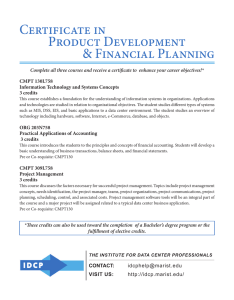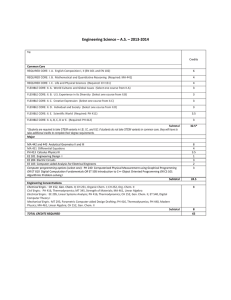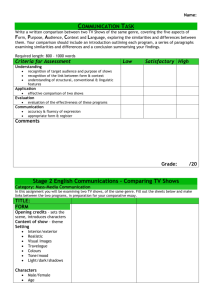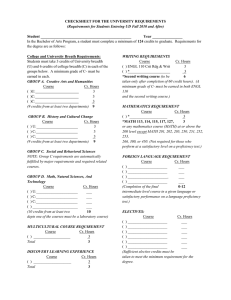advertisement
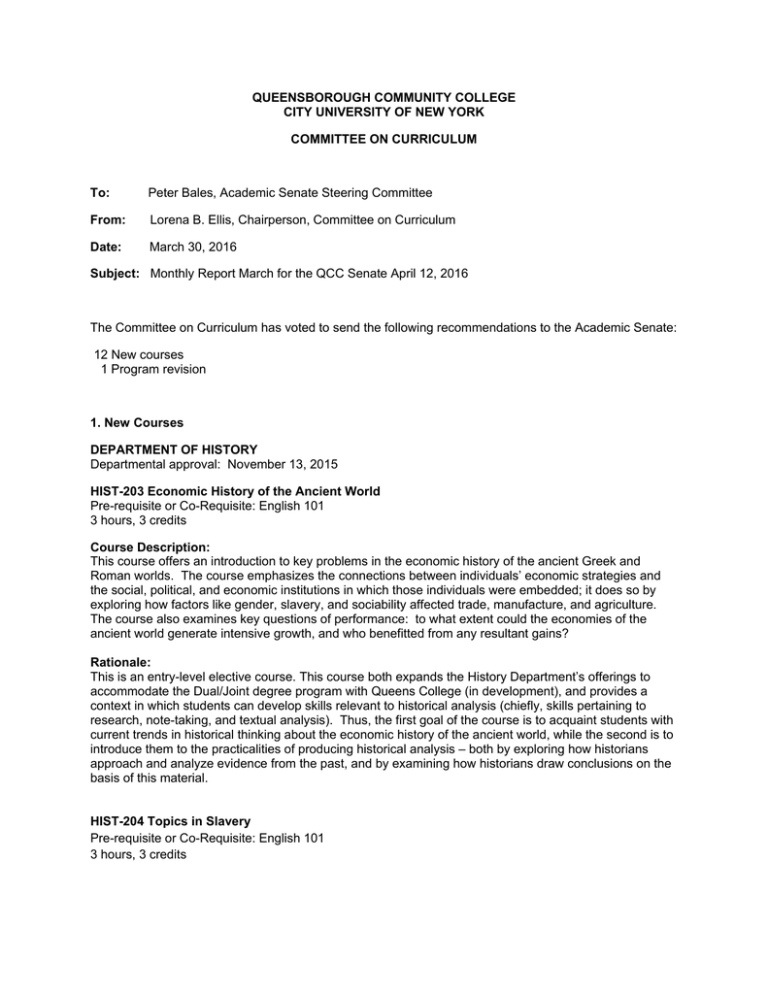
QUEENSBOROUGH COMMUNITY COLLEGE CITY UNIVERSITY OF NEW YORK COMMITTEE ON CURRICULUM To: Peter Bales, Academic Senate Steering Committee From: Lorena B. Ellis, Chairperson, Committee on Curriculum Date: March 30, 2016 Subject: Monthly Report March for the QCC Senate April 12, 2016 The Committee on Curriculum has voted to send the following recommendations to the Academic Senate: 12 New courses 1 Program revision 1. New Courses DEPARTMENT OF HISTORY Departmental approval: November 13, 2015 HIST-203 Economic History of the Ancient World Pre-requisite or Co-Requisite: English 101 3 hours, 3 credits Course Description: This course offers an introduction to key problems in the economic history of the ancient Greek and Roman worlds. The course emphasizes the connections between individuals’ economic strategies and the social, political, and economic institutions in which those individuals were embedded; it does so by exploring how factors like gender, slavery, and sociability affected trade, manufacture, and agriculture. The course also examines key questions of performance: to what extent could the economies of the ancient world generate intensive growth, and who benefitted from any resultant gains? Rationale: This is an entry-level elective course. This course both expands the History Department’s offerings to accommodate the Dual/Joint degree program with Queens College (in development), and provides a context in which students can develop skills relevant to historical analysis (chiefly, skills pertaining to research, note-taking, and textual analysis). Thus, the first goal of the course is to acquaint students with current trends in historical thinking about the economic history of the ancient world, while the second is to introduce them to the practicalities of producing historical analysis – both by exploring how historians approach and analyze evidence from the past, and by examining how historians draw conclusions on the basis of this material. HIST-204 Topics in Slavery Pre-requisite or Co-Requisite: English 101 3 hours, 3 credits Course Description: This course explores slavery in its social, cultural, and economic contexts. Each semester may focus on different time periods. The problems to be investigated include the origins and development of chattel slavery in theses societies; the impact of slave systems on the socio-economic structures and cultures of their host societies; the effort of slaves to exercise agency through accommodation of resistance; and the role and frequency of manumission in various societies. Rationale: This is an entry level elective course that both expands the History Department’s offerings to accommodate the Dual/Joint degree program with Queens College (in development), and provides a context in which students can develop skills relevant to historical analysis (chiefly, skills pertaining to research, note-taking, and textual analysis). Thus, the first goal of the course is to acquaint students with current trends in historical thinking about slavery, while the second is to introduce them to the practicalities of producing historical analysis – both by exploring how historians approach and analyze evidence from the past, and by examining how historians draw conclusions on the basis of this material. HIST-212 History of Piracy and the Sea Pre-requisite or Co-Requisite: English 101 3 hours, 3 credits Course Description: This course surveys the maritime history of the world by focusing on the history of maritime theft, or piracy, as a means to investigate the history of sea-borne trade; maritime aggression; littoral communities; and international law. Course readings will draw from a range of primary sources, including narrative histories; legal texts; and works of fiction, as well as selected readings from scholarly writing on the history of overseas trade, exploration, piracy, maritime warfare; and maritime law. Rationale: This is an entry-level elective course that provides students with a knowledge of the history of piracy and its relationship to maritime history from ancient times to the present. The study of piracy incorporates a consideration of history of maritime trade; the history of warfare and aggression; the history of littoral and seafaring communities; the history of slavery; and the history of international law. Piracy and maritime history are documented by a rich range of narrative, literary and legal texts that provide challenging and engaging opportunities for students to engage in the analysis of complex texts. A course on the history of piracy and the sea will thus help fulfill the college mission of promoting intellectual inquiry and global awareness among students. This course will also enable students to develop research, note-taking, and textual interpretation skills. It was developed to expand the history department offerings to accommodate the new Dual/Joint program in development with Queens College HIST-219 History of the Mediterranean Pre-requisite or Co-Requisite: English 101 3 hours, 3 credits Course Description: This course surveys the history of Mediterranean society from ancient times to the present. Among topics to be included will be: geo-political; environmental and cultural diversity around the Mediterranean; war, commercial, political and religious rivalries; religious and ethnic traditions; social practices; and slavery. Special attention will be dedicated to primary source documents, and historiography. Rationale: This is an entry level elective course that provides students with a knowledge of the history of the Mediterranean, and how the study of the Mediterranean has shaped a more general scholarly understanding of European history. The history of the Mediterranean is understood as a point of origin, contact, and conflict between the three monotheistic faiths of western European society. This course will offer an introduction to the history of their interactions from a political, economic, social and cultural perspective. A course on the history of the Mediterranean will help fulfill the college mission of promoting intellectual inquiry and global awareness among students. The course enables students to develop research, note-taking, and textual interpretation skills. It was developed to expand the history department offerings to accommodate the new Dual/Joint program in development with Queens College HIST-223 History of the Cold War Pre-requisite or Co-Requisite: English 101 3 hours, 3 credits Course Description: This course examines the history, as well as cultural, ideological and intellectual impact of the events between 1945 and 1991. It will focus on Europe, Asia, the Middle East and the United States as well as on the economic, political, and social impacts that were caused by the Cold War. The course discusses the historical context in which the Cold War was fought and ended. Rationale: This is an entry level elective course that provides students with knowledge of the Cold War in a global context in the twentieth century. The history of this war is recognized for its impact on global phenomena with compelling interest as ethical and historical problems. A course on the history of Cold War will help to fulfill the college mission of promoting intellectual inquiry and global awareness among students. The course enables students to develop research, note-taking and textual interpretation skills. The course was developed as part o f a series of courses covering global issues of the twentieth century. It was developed to expand the history department offerings to accommodate the new Dual/Joint program in development with Queens College. HIST-247: “History of the Modern Middle East, 1795-2011 Pre-requisite or Co-Requisite: English 101 3 hours, 3 credits Course Description: This course examines the history, as well as cultural, ideological and intellectual impact of the events between 1795 and 2011. The course focuses on the Modern Middle East’s role in the world as well as on the economic, political, and social impacts that were caused by developments that took place there. The course discusses the historical context in which the Modern Middle East developed and in which ways it has impacted on the world. Rationale: This is an entry level elective course that provides students with knowledge of the Modern Middle East in a global context in the nineteenth and twentieth century. The history of this country is studied for its impact on global phenomena with compelling interest as social and historical problems. A course on the history of the Modern Middle East will help to fulfill the college mission of promoting intellectual inquiry and global awareness among students. The course enables students to develop research, note-taking and textual interpretation skills. The course was developed as part of a series of courses covering global issues of the twentieth century. It was developed to expand the history department offerings to accommodate the new Dual/Joint program in development with Queens College. HIST-263 History of American Cities Pre-requisite or Co-Requisite: English 101 3 hours, 3 credits Course Description: This course examines the development of America’s cities and suburbs from the Civil War through the present. The course looks at the dramatic transformation of the United States from predominantly rural society to a majority urban nation and its consequences. This includes the challenges of population growth and slum development, the influence of federal and municipal government on urban and suburban development, racial and class segregation, the evolution of urban cultures, the threat of ‘violence’ and ‘disorder,’ and in the last four decades, the impact of deindustrialization, globalization, and gentrification. Readings are a combination of primary sources and historical monographs. Rationale: This is an entry level course that produces students who understand the development of America’s cities and suburbs from the late nineteenth century to the present. The course enables students to develop research, note-taking, and textual interpretation skills. On a broader level, the course situates the urban environment in an historical context, providing students with an awareness of the urban legal, spatial, and economic structures navigate on a daily basis. When students leave the classroom, they will enter workplaces, rent or buy property, and engage in leisure activities within the very urban environment examined during this course. It was developed to expand the history department offerings to accommodate the new Dual/Joint program in development with Queens College. ENGINEERING TECHNOLOGY Departmental approval date March 16, 2016. ET-580 Object Oriented Programming Pre‐requisites: ET-575 Introduction to C++ Programming Design and Implementation 3 hours, 3 credits Course Description: This course covers object-oriented programming principles and techniques using C++. Topics include pointers, classes, overloading, data abstraction, information hiding, encapsulation, inheritance, polymorphism, file processing, templates, exceptions, container classes, and low-level language features. Rationale: Object Oriented programming is a programming style that is associated with the concept of objects, having data fields and related member functions. Objects are instances of classes and are used to interact amongst each other to create applications. Instance means, the object of class on which we are currently working. C++ can be said to be as C language with classes. In C++ everything revolves around object of class, which have their methods & data members. This course will help students master all techniques of software development in the C++ Programming Language and demonstrate these techniques by the solution of a variety of problems spanning the breadth of the language. ET-585 - Computer Architecture Pre-requisite or Co-Requisite: English 101 3 hours, 3 credits Course Description: The course covers the basic principles of computer organization, operation and performance. It also deals with embedded systems, peripheral devices, memory management, and processor family evolution patterns. Rationale: This course provides a strong foundation for students to understand modern computer system architecture and to apply these understandings and principles to future computer designs. It is structured around the three primary building blocks of general-purpose computing systems: processors, memories, and networks. It will prepare the students for jobs in the computer science and computer engineering industry and can act as a spring board to more advance level courses. ENGLISH DEPARTMENT Departmental approval revisions: March 25, 2016 ENGL 205 - Literary History Pre-requisite: English 102 3 class hours, 1 recitation hour, 4 credits Course Description: An exploration of how literary artists and their creations have responded to earlier writers, and how such responses have historically impacted literature in English. Students will also enhance their analytical and interpretative skills through writing about literary traditions, genres, periods, and movements. Readings include representative genre texts from at least two national literatures and historical periods. Rationale: This course offers a critical framework for understanding literary history and the way it has shaped literary studies, exploring the resonances and disjunctions between literary movements and traditions, as well as their corresponding historical contexts. By identifying these patterns in a diverse array of texts, genres and literary periods, students will be able to draw on new and prior knowledge as a means to hone their critical reading and writing skills. This course differentiates itself from traditional literary survey courses, as it offers both narrower and deeper focus on genre, national literatures, and historical periods. This course articulates with Queens College, ENGL 242: Literary History, a four-hour course within QC’s English major, thus making transfer to Queens highly efficient and attractive to students (see Item 19). Offering ENGL 205 as a regular class will further facilitate students’ ability to transfer by making the course description readily available within CUNY in TIPPS and in the catalog for reference to outside institutions. ENGL 206 – Genre Pre-requisite: English 102 3 class hours, 1 recitation hour, 4 credits Course Description: Broadly defined, genre refers to different forms of literary expression, such as fiction, poetry, and drama, but genres are also a reflection of cultural contexts and traditions. In this course, students will focus on different definitions of genre; issues of form, style, and content; and how ideas about genre change over time. Readings will include texts from at least two genres and two national literatures as well as material from before and after 1800. Rationale: This course will offer a critical framework for understanding genre and the way it has framed literary studies, teaching broad areas of genre such as fiction, poetry, drama, or film, and highlighting other modes such as horror and romance, or fantasy and myth. By recognizing prior expectations and familiar patterns within a diverse array of texts (including genre theory and criticism), students will be able to draw on past learning as a means to engage and/or revise assumptions to enrich critical thinking and writing skills. This course articulates with Queens College ENGL 243: Genre, a four-hour course within QC’s English major, thus making transfer to Queens highly efficient and attractive to students (see item 19). Offering ENGL 206 as a regular class will further facilitate students’ ability to transfer by making the course description readily available within CUNY in TIPPS and in the catalog for reference to outside institutions. ENGL 220 - Introduction to Creative Writing Pre-requisite: English 102 3 class hours, 1 recitation hour, 4 credits Course Description: A workshop class that introduces writers to the elements of poetry, fiction, drama, and creative nonfiction. Students explore through their own writing and reading of published writers the conventions of each genre, the interrelationships between them, the diversity of expression possible in each. Students will engage with in-class writing exercises, group writing, workshop critique, technique-specific practices, reading and group discussion with the aim of creating a collection of creative work in several genres. Rationale: Most four-year colleges with CUNY have a sophomore-level Introduction to Creative Writing class, followed by genre specific writing courses. QCC currently offers fiction and poetry writing classes (ENGL 221 and 222) for both introductory students and more advanced students, combined. Creating an introductory level creative writing course would better serve both new and advanced writing students, allowing deeper exploration of genres for advanced students. Such a course would allow English major and concentration students better preparation for transfer, particularly if they are considering a creative writing emphasis after transfer from QCC. 3. Program Revision Departmental approval date March 16, 2016. Program revision for the A.S. in Engineering Science HEGIS: 5609 NYSED Code: 01521 Effective: Upon approval To: A.S. in Engineering Science From: A.S. in Engineering Science Common Core REQUIRED CORE: I. A: English Composition I, II (ENGL 101 and ENGL 102) REQUIRED CORE: I. B: Mathematical & Quantitative Reasoning (Required: MA 441) REQUIRED CORE: I. C: Life & Physical Sciences (Required: CH 151) FLEXIBLE CORE: II. A: World Cultures & Global Issues (Select one course from II.A) FLEXIBLE CORE: II. B: U.S. Experience in Its Diversity (Select one course from II.B) FLEXIBLE CORE: II. C: Creative Expression (Select one course from II.C) FLEXIBLE CORE: II. D: Individual & Society (Select one course from II.D) FLEXIBLE CORE: II. E: Scientific World (Required: PH 411) FLEXIBLE CORE: II: A, B, C, D or E (Required: PH 412) Subtotal *Students are required to take STEM variants in I.B, I.C, and II.E; if students do not take STEM variants in common core, they will have to take Credits 6 4 4 3 3 3 3 3.5 3 32.5* Common Core REQUIRED CORE: I. A: English Composition I, II (ENGL 101 and ENGL102) REQUIRED CORE: I. B: Mathematical & Quantitative Reasoning (Required: MA 441) REQUIRED CORE: I. C: Life & Physical Sciences (Required: CH 151) FLEXIBLE CORE: II. A: World Cultures & Global Issues (Select one course from II.A) FLEXIBLE CORE: II. B: U.S. Experience in Its Diversity (Select one course from II.B) FLEXIBLE CORE: II. C: Creative Expression (Select one course from II.C) FLEXIBLE CORE: II. D: Individual & Society (Select one course from II.D) FLEXIBLE CORE: II. E: Scientific World (Required: PH 411) FLEXIBLE CORE: II: A, B, C, D or E (Required: PH 412) Subtotal *Students are required to take STEM variants in I.B, I.C, and II.E; if students do not take STEM variants in common core, they will have to take Credits 6 4 4.5 3 3 3 3 3.5 3 33* additional credits to complete their degree requirements. additional credits to complete their degree requirements. Major MA 442 and 443 Analytical Geometry II and III MA 451 Differential Equations PH 413 Calculus Physics III EE 101 Engineering Design I EE 204 Electric Circuits EE 103 Computer-aided Analysis for Electrical Engineers Computer programming options (select one): PH 240 Computerized Physical Measurement using Graphical Programming OR ET 810 Digital Computation Fundamentals OR ET 505 Introduction to C++ Object Oriented Programming OR CS 101 Algorithmic Problem solving I Major 8 4 3.5 1 3 2 3 Subtotal 24.5 Engineering Concentrations Chemical Engin.: CH 152, Gen. Chem. II; CH 251, Organic Chem. I; CH 252, Org. Chem. II Civil Engin.: PH 416, Thermodynamics; MT 345, Strength of Materials; MA 461, Linear Algebra Electrical Engin.: EE 205, Linear Systems Analysis; PH 416, Thermodynamics; CH 152, Gen. 8 Chem. II; ET 540, Digital Computer Theory I Mechanical Engin.: MT 293, Parametric Computer-aided Design Drafting; PH 416, Thermodynamics; PH 440, Modern Physics; MA 461, Linear Algebra; CH 152, Gen. Chem. II Subtotal 8 65 TOTAL CREDITS REQUIRED MA 442 and 443 Analytical Geometry II and III MA 451 Differential Equations PH 413 Calculus Physics III EE 101 Engineering Design I EE 204 Electric Circuits EE 103 Computer-aided Analysis for Electrical Engineers Computer programming options (select one): PH 240 Computerized Physical Measurement using Graphical Programming OR ET 575 Introduction to C++ Programming Design and Implementation OR ET 505 Introduction to C++ Object Oriented Programming OR CS 101 Algorithmic Problem solving I Subtotal 8 4 3.5 1 3 2 3-4 24.5 25.5 Engineering Advised Electives Students may select from any of the following courses: Chemical Engin.: CH 152, Gen. Chem. II; CH 251, Organic Chem. I; CH 252, Org. Chem. II Civil Engin.: PH 416, Thermodynamics; MT 345, Strength of Materials; MA 461, Linear Algebra Electrical Engin.: EE 205, Linear Systems Analysis; PH 416, Thermodynamics; CH 152, Gen. Chem. II; ET 540, Digital Computer Theory I Mechanical Engin.: MT 293, Parametric Computer-aided Design Drafting; PH 416, Thermodynamics; PH 440, Modern Physics; MA 461, Linear Algebra; CH 152, Gen. Chem. II Subtotal 6.5-7.5 65 TOTAL CREDITS REQUIRED Rationale: Most of the changes are corrections. Credit subtotals have been corrected to reflect actual course credits. ET-810 is no longer offered so ET-575 Introduction to C++ Programming Design and Implementation has been added as a Computer Programming option. The term Engineering Concentrations has been changed to Engineering Advised Electives, to reflect the intent of the previous program revision. This allows students greater choice for better alignment with individual baccalaureate programs.

